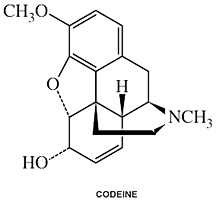

Codeine
Brand Names: Tylenol III
Clinical Names: Codeine; Codeine phosphate
Summary
generic name: Codeine phosphate
synonym: Codeine
trade name: Tylenol III®
type of drug: Narcotic pain reliever (analgesic); cough suppressant.
used to treat: Pain and cough; codeine is frequently combined with Tylenol or aspirin for more effective pain relief.
overview of interactions:
• herbs affecting drug performance: Salicylate-containing Herbs
such as Betula lenta (Sweet Birch), Cimicifuga racemosa (Black Cohosh), Filipendula ulmaria (Meadowsweet),
Gaultheria procumbens (Wintergreen), Populus canadensis (Poplar bark and/or buds), and Salix
spp. (Willow)
• herbs affecting drug performance: Herbs containing Tannins such as
Camellia sinensis (Green Tea and Black Tea), Arctostaphylos uva-ursi (Uva
ursi), Juglans nigra (Black Walnut), Rubus idaeus (Red raspberry), Quercus
spp. (Oak), and Hamamelis virginiana (Witch Hazel)
Interactions
herbs affecting drug performance: Salicylate-containing Herbs
such as Betula lenta (Sweet Birch), Cimicifuga racemosa (Black Cohosh), Filipendula ulmaria (Meadowsweet),
Gaultheria procumbens (Wintergreen), Populus canadensis (Poplar bark and/or buds), and
Salix spp. (Willow)
Note: See Herb Groups: Salicylate-containing for a full list of herbs in common use containing
salicylates.
• reports: It has been suggested by some authororities that since salicylate-containing herbs can selectively precipitate some alkaloids, high doses of these herbs may impair the absorption of codeine.
(Brinker F. J Naturopathic Med 1997;7(2):14-20; Brinker F. 96, 99-100, 1997.)
• mechanism: Pharmacokinetic data on salicylate-containing herbs suggest that naturally occurring phenolic glycosides act pharmacokinetically as pro-drugs, with a much slower rise to maximum plasma concentrations than with aspirin and related salicylate drugs. In addition, the existence of several commercial codeine and aspirin combination preparations are listed in the literature (PDR 1999) and the bioavailability of the combination, e.g., Fiorinal with Codeine®, is listed as equivalent to the bioavailability of the separate components, suggesting that pharmacokinetic interaction is unlikely.
• interaction concerns: Herbs high in salicylates should not be consumed concurrently with codeine administration as a general precaution against the possible reduction of bioavailability of the drug.
herbs affecting drug performance: Herbs containing Tannins such
as Camellia sinensis (Green Tea and Black Tea), Arctostaphylos uva-ursi (Uva ursi),
Juglans nigra (Black Walnut), Rubus idaeus (Red Raspberry), Quercus spp. (Oak), and
Hamamelis virginiana (Witch Hazel)
Note: See Herb Groups: GI Modifiers: Tannins for full listing
• mechanism: Herbs high which yield high amounts of tannins when extracted by hot water can precipitate alkaloids. Tannins may also complex proteins, carbohydrates and other large molecules, hence they may exert various effects on nutrient and drug availability. On the whole, specific data are lacking, although pH is a significant determinant of precipitate solubility.
Tannins will not precipitate low concentrations of alkaloidal salts in the presence of many gums present in plants such as Acacia, Agar, Aloe, Flax, Guar, Irish moss, Locust bean, Marshmallow root, Okra fruit, pectin powder, Psyllium seed husks and Slippery Elm bark.
(Brinker F. J Naturopathic Med 1997;7(2):14-20; Brinker F. 1997, 99-101.)
• interaction concerns: Herbs high in tannins should not be consumed concurrently with codeine administration as a general precaution against the possible reduction of bioavailability of the drug.

![]()
Please read the disclaimer concerning the intent and limitations of the information provided here.
Do not rely solely on the information in this article.
The information presented in Interactions is for informational and educational purposes only. It is based on scientific studies (human, animal, or in vitro), clinical experience, case reports, and/or traditional usage with sources as cited in each topic. The results reported may not necessarily occur in all individuals and different individuals with the same medical conditions with the same symptoms will often require differing treatments. For many of the conditions discussed, treatment with conventional medical therapies, including prescription drugs or over-the-counter medications, is also available. Consult your physician, an appropriately trained healthcare practitioner, and/or pharmacist for any health concern or medical problem before using any herbal products or nutritional supplements or before making any changes in prescribed medications and/or before attempting to independently treat a medical condition using supplements, herbs, remedies, or other forms of self-care.
References
Brinker F. Interactions of pharmaceutical and botanical medicines. J Naturopathic Med 1997;7(2):14-20.
Brinker F. Herb Contraindications and Drug Interactions. Sandy, OR: Eclectic Institute, Inc., 1997; 2nd Ed. 1998.
Various authors. Physicians Desk Reference®. 53rd edition. Medical Economics, 1999.